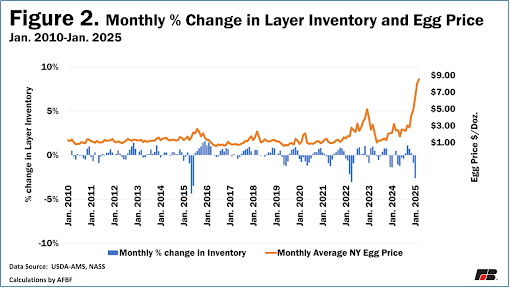Valley Hatchery Urban Chicken-Keeping
Thursday, December 4, 2025
Friday, November 21, 2025
Thursday, October 16, 2025
Thursday, September 11, 2025
Monday, August 25, 2025
Friday, August 1, 2025
Monday, June 30, 2025
The Benefits Of Raising Your Own Chickens In This Economic Climate
The Grocery-Store Reality
Egg prices have been anything but stable: in January 2025 the national average topped four-and-a-half dollars a dozen, more than sixty percent higher than 2021. Even when wholesale costs dip for a month or two, the savings rarely show up on retail shelves right away. Add general inflation—feed, produce, utilities—and many families are hunting for permanent ways to trim their food bills and gain a little peace of mind.
Six Ways Backyard Birds Fight Inflation
Stable Egg Costs
Once your coop and equipment are paid for, most small flocks lay eggs for roughly a dollar-and-a-half a dozen in feed. That can save a typical family well over a hundred dollars a year whenever store prices hover above four dollars.
Premium Nutrition
Fresh, yard-to-table eggs routinely test higher in vitamin D and omega-3 fats and lower in saturated fat than supermarket cartons. Better nutrition at a lower price is hard to beat.
Free Fertilizer
Ten hens can produce seven-hundred pounds of manure a year—black-gold compost that would cost fifty to eighty dollars if you bought it in bags.
Natural Pest Control
Chickens devour ticks, grasshoppers, and other garden pests. Fewer bugs mean less money spent on sprays and traps.
Mental-Health ROI
“Chicken TV” is real. Research shows that caring for animals lowers stress and boosts mood—benefits hard to put a dollar value on, but priceless all the same.
Micro-Income Streams
Even a half-dozen extra cartons a week can turn into twelve hundred dollars a year at five dollars per dozen. Hatching chicks, selling compost tea, or leasing a rooster for breeding all add to the bottom line.
What It Really Costs to Start
A basic six-hen setup breaks down like this:
- Coop kit: about $300-400
- Build your own from recycled and reclaimed material as inexpensively as $0
- Feeder and waterer: $45-55
- Bedding and misc. supplies: $40-60
Bird-buying Caveats
Monthly expenses
Good layer feed, grit, oyster shell, and small incidentals run a little over thirty dollars for six hens. Under those assumptions, most households hit break-even in roughly eleven months—and even sooner if they sell a few surplus eggs and keep unnecessary treat purchases to a minimum. 😉
If your yard is large enough to let your birds roam it freely once or twice a week, you can save on feed costs as they gobble up insects and weedy plants. (Be aware they will also eat your grass!)
Food Security and Community
Remember the avian-flu egg shortage back in 2022? Supply shocks are less scary when breakfast is clucking in your own backyard. Extra cartons make welcome gifts for neighbors, and many will happily chip in for feed once they taste the difference.
Some friendly neighbors might establish co-operative chicken coops, where the coop resides in one specific yard, but the surrounding neighbors who enjoy the eggs all regularly chip in for feed, supplies, and maintenance in exchange for the eggs they get. This can help offset some of the ongoing labor and costs incurred when keeping the flock.
Controlling Costs
Ready to Get Started?
Valley Hatchery’s selection of pullets includes hardy, heat-tolerant layers that thrive in most U.S. climates, shipping out at around 15 weeks of age, which means you only have to wait a few short weeks before they start laying regularly. Take control of your grocery bill, boost your family’s nutrition, and enjoy the daily therapy of tending a flock that pays you back in fresh eggs every morning.
Visit ValleyHatchery.com today and let’s make your coop-dreams a reality! 🐔🐣🥚
-
Hey Urban Chicken Enthusiasts! Are you excited for chick season at Valley Hatchery ? Here are some fun and handy tips to ensure you have an ...
-
When severe thunderstorm season rolls in, it's not just us humans who need to hunker down and ride out the storm—our feathered friends n...
-
3 Tips for successful chicken flock management Raising a chicken flock can become quite a challenge, even if your flock is a small urban c...






